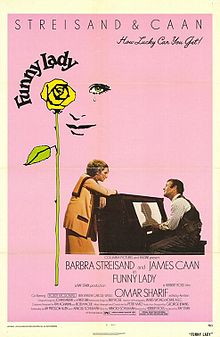
FUNNY LADY
US, 1975, 138 minutes, Colour.
Barbra Streisand, James Caan, Omar Sharif, Roddy Mc Dowall, Ben Vereen.
Directed by Herbert Ross.
Funny Lady is a sequel. Barbra Streisand had enormous impact in her Oscar-winning first film, Funny Girl. Her fans may find it hard to remember just what that fresh star quality consisted of. This film is worth seeing for Streisand followers because, once again, she makes that dynamic impression - in comic gems (too rare, unfortunately), in pathos and song. The first film began hilariously but became rather solemn; the same happens here, only more so. A pity, since James Caan shows Streisand-like verve as Billy Rose; on the whole, the film should have been more dynamic. As it is, it is enjoyable, the two stars excellent, but too many slow patches.
1. This film as a sequel, the impact of Fanny Brice, Billy Rose? A Barbra Streisand vehicle? Could the film stand by itself?
2. How well did the credits reprise the original? The focus on Fanny Brice in close-up, the illustration by song and her being a funny lady?
3. The impact of Fanny Brice: Barbra Streisand’s style, the background of her upbringing, career, success? At the peak of her success and the close of a show? Her anticipation, love for Nicky Arnstein, the impact of the divorce? How much of a character study of Fanny Brice was given in this film?
4. The character of Bobby, his continued support and presence? The support of her mid?
5. The introduction to Billy Rose, the exhibition of his memory and shorthand, his funny style, pushiness? Fanny's reaction to him about the cafe, the song? His immediate impression on the audience? How much of a pushing, confidence man?
6. Was the partnership between Billy and Fanny credible? The illustrations of Billy's push for example, his deals about painting the chair, running of the restaurant, supervising the records, planning the various shows? His arranging shows without consulting people? How well did the film delineate his character? His influence on show business? An American character?
7. Why was Fanny fascinated by him? His song, the making of the record, fronting him about using her for the show, supporting him during the show?
8. How important was the comedy of the first night of the show, everything going wrong, the various sequences and songs, turned funny? Billy's trying to persuade Fanny to support him at four o'clock in the morning? What kind of person was he?
9. The presentation of the encounter between the two, especially at rehearsals, the subjective voiced? over singing? How convincing did this make the relationship?
10. The humour of his proposal, the nature of the ceremony, people's reactions to him? The travelling sequence and the song in the train after the discussion about the pyjamas? The contrast between Fanny being a lady and his ignorance, his being 'Mr. Brice'? How credible was this experience of the husband of a famous woman?
11. The presentation of their careers, their plans, the passing of the years, their passing in trains? Illustrated by the conversation with the two phones? Newspapers and rumours?
12. The importance of the encounter at Cleveland? Fanny and the feeling about her marriage, Billy and his attitude towards Fanny, Eleanor? Fanny's funny performance in the Aquacade?
13. The pervading presence of Nick? His filing for the divorce, his marriage to the wealthy socialite and Fanny's reaction to this, Norma's engineering Fanny to meet him in California, his polo-playing, charm, his proposition and her reaction that she was free? Her long walk down the corridor in sign of this freedom?
14. The plausibility of Fanny's disillusionment with Billy? His liaison with Eleanor and her reaction? The sequence between them at the railway station, the broken marriage?
15. The effect of two broken marriages on her, the emphasis on her career, especially the radio? Her ageing?
16. How important was the sequence where they met again, each successful and wealthy, each older? A sentimental meeting?
17. Comment on the use of songs and their staging, the title sequence, the comedy of the first night, the use of the stage for Fanny to sing, the use of mirrors etc.? The focus on Fanny? The show songs, for instance, 'Great Day', 'Clap Hands, Here Comes Charlie'? The traditional love songs? The new songs written for this film?
18. How much more than conventional biography was this film? How much more than conventional backstage drama? Themes of careers, love, self-giving, personality loves and clashes?